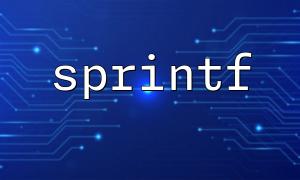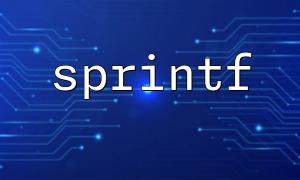In PHP, the sprintf function is a very powerful string formatting tool that can format data into strings and return formatted results. However, when using sprintf , many developers may accidentally step on some pitfalls, causing the program to go wrong or the results are not as expected. This article will summarize some common problems and pitfalls in the use of printf / sprintf functions and give solutions.
The purpose of the sprintf function is to insert the specified parameter into the placeholder position in the format string. Usually the format character needs to match the passed parameter type. If the types do not match, an error will be caused.
For example:
$intValue = 123;
$floatValue = 45.67;
echo sprintf("Integer value: %f, Float value: %d", $intValue, $floatValue);
In the above code, we pass the integer to %f (floating formatter), and the floating point to %d (integer formatter). This can cause the output to be unsatisfied and even produce warnings or errors in some cases.
Solution: Make sure the formatter matches the data type:
echo sprintf("Integer value: %d, Float value: %.2f", $intValue, $floatValue);
PHP's sprintf supports a variety of formats, such as %d represents an integer, %s represents a string, %f represents a floating number, etc. But if the wrong formatter is used, the program will not work as expected.
For example, %d should be used for integers and %f should be used for floating numbers. If other characters are misused, such as %x , to format a string, it may cause unpredictable results or errors.
Solution: Make sure that the formatter used is consistent with the type of variable to be formatted.
The sprintf function not only supports basic formatting operations, but also supports controlling the width and precision of the output string. For example:
$price = 12.34567;
echo sprintf("Price: %.2f", $price);
In the above code, %.2f will round the floating number and retain two decimal places. If you do not specify the accuracy or width, you may get results that do not meet the requirements.
Solution: Use accuracy and width reasonably to ensure that the output result format meets the requirements. For example:
echo sprintf("Width controlled: %10d", 123);
printf / sprintf allows you to pass multiple parameters, but if the formatter does not match the order of the actually passed parameters, an error will occur or the output will not be as expected.
For example:
echo sprintf("Name: %s, Age: %d", 30, "John");
This will incorrectly process the number 30 as a string and treat "John" as an integer, causing an output error.
Solution: Always make sure the order of parameters is consistent with the formatter, or use position tags to specify the order of parameters:
echo sprintf("Name: %2\$s, Age: %1\$d", 30, "John");
It can cause overflow problems when the string you format exceeds the expected width. for example:
$longString = "This is a very long string that exceeds the width.";
echo sprintf("%10s", $longString);
In the above code, since the string is too long, %10s will try to fill it to a width of 10 characters, but in reality this will cause the output string to be truncated or displayed incompletely.
Solution: When formatting the string, make sure that the output length does not exceed the set width.
With floating numbers, sometimes you will have the problem of displaying numbers in scientific notation, especially when dealing with larger numbers. If you do not want to display it in the form of scientific notation, you can use the formatter %.f to force output to float format:
echo sprintf("%.3f", 1234567890.12345); // Output1234567890.123
Solution: Use precision control to ensure that the output does not become a scientific notation method.
In some cases, developers may try to use formats that are not supported by PHP, or rely too much on implementations of different PHP versions. The sprintf function may behave differently in different PHP versions, especially when dealing with some complex data types.
Solution: Check the PHP documentation carefully to ensure that the formatters used are compatible with the PHP version and avoid using unspecified supported formatters.
Although PHP's sprintf function is very powerful, it is easy to encounter some common problems in actual use. As long as you have some understanding of the details of format characters, parameter order, accuracy control, etc., you can avoid stepping on these pitfalls and ensure the stable operation of the program. I hope that the problems and solutions summarized in this article can help you better use the sprintf function and improve development efficiency.















